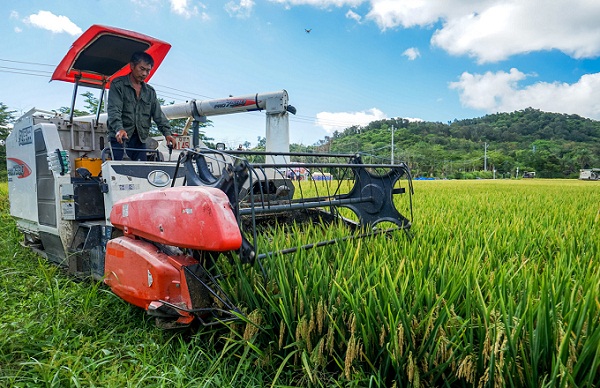
Rice harvesters reap a new, highly productive hybrid variety of the staple grain in the demonstration fields of Sanya National Paddy Park in Hainan province. [Photo by Wu Wei/For chinadaily.com.cn]
HAIKOU -- In a vast cornfield in Sanya, South China's Hainan province, Cheng Xiangwen takes notes while carefully examining the corn plants.
Cheng, 86, is an agronomist who has spent most of his life studying and cultivating corn. He goes to Sanya every November and spends six months there, working on corn seed breeding.
"I am getting old," he said. "But as long as I can work, I will continue to focus on the development of corn farming."
Cheng is just one of many scientists specializing in seed breeding at the Nanfan breeding base, which is dubbed the "silicon valley" of China's seed industry.
Xi Jinping, general secretary of the Communist Party of China Central Committee, on Sunday stressed the crucial role of "Chinese seeds" in ensuring food security for the country when inspecting the Yazhou Bay Seed Laboratory in Sanya.
China's food security can only be safeguarded when seed resources are firmly held in our own hands, Xi said during the inspection.
Covering areas in the city of Sanya and the counties of Lingshui and Ledong, Nanfan is the country's largest experimental zone for agricultural science and technology. Thousands of scientists from across the country visit the base each year to undertake seed breeding, thanks to its unique light and heat resources.
Authorities in Hainan have adopted relevant measures to boost the development of the national seed breeding base.
The Yazhou Bay Seed Laboratory, which opened in May last year, has gathered over 800 research staff to work toward seed industry innovation in Hainan in collaboration with 19 member institutions.
Yang Weicai, director of the seed laboratory, said that the construction of the Hainan free trade port has created an environment conducive to seed industry innovation.
"We have the confidence to do great work in the lab, and we will try our best to contribute to our national food security efforts," said Yang, who is also an academician with the Chinese Academy of Sciences. He added that the lab was built to support the development of the breeding base.
Thanks to decades of efforts, the Nanfan seed breeding base has laid a solid ground for food security. According to official statistics, more than 70 percent of the country's new crop varieties were cultivated at the Hainan breeding base.
Thanks to this breeding base, China's major crops have evolved up to seven generations, with each generation yielding at least 10 percent more than the previous generation.
China's grain output reached nearly 683 billion kg in 2021, up 13.4 billion kg from the previous year. It was the seventh consecutive year that the country's total grain production exceeded 650 billion kg.